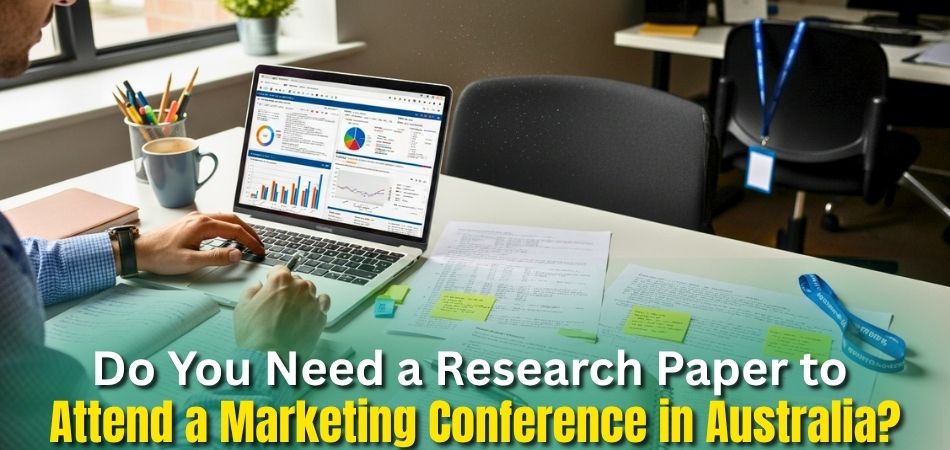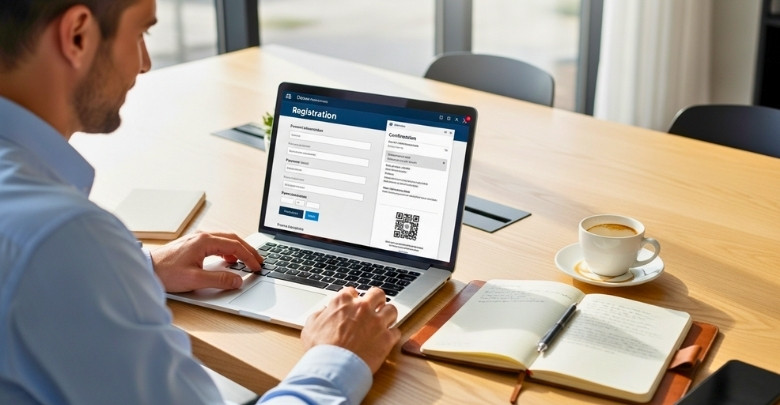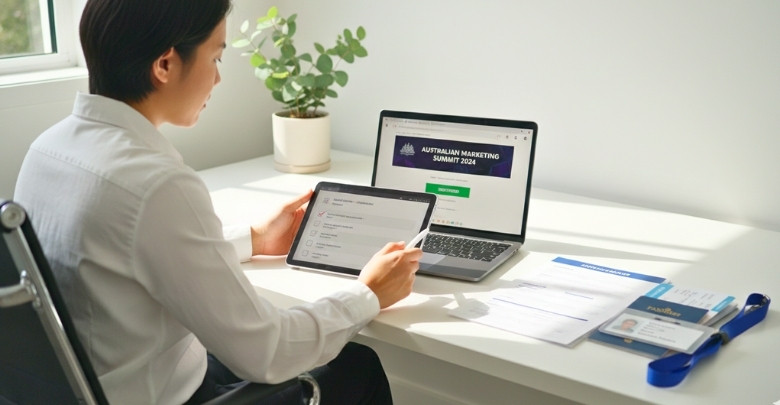If you’re planning to attend a marketing conference in Australia, you may be asking, “Do you need a research paper to attend a marketing conference in Australia?” The short answer is no, not always. While some academic events expect participants to submit research papers for presentation, most professional and industry-focused marketing conferences allow attendees to join without submitting one.
Understanding this difference helps you choose conferences that suit your goals, whether you want to share research, build networks, or simply learn from experts. In the next sections, learn how to identify the right type of conference, understand submission requirements, and make your participation in Australia truly worthwhile.
Do You Need a Research Paper to Attend a Marketing Conference in Australia?
The short answer is no, you don’t always need a research paper to attend a marketing conference in Australia. Academic conferences usually require paper submissions, but professional and industry-focused events welcome participants without research work. You can explore different formats through various upcoming conferences in Australia to understand which suits your goals. Most attendees join to learn, network, or share insights rather than present formal research. Keep reading to discover when a paper is required and how you can participate effectively in different conference settings.

Presenting Original Research
If your objective is to present findings from your own study, you’ll need to submit a paper or abstract for review. The committee evaluates originality, methodology, and relevance before accepting it for presentation at the conference. This process ensures academic quality and recognition for your work.
Applying for Presenter or Author Registration
Presenter or author categories always require a valid paper submission. You must follow the conference’s formatting guidelines, include references, and meet submission deadlines. Once accepted, you’ll gain the opportunity to present your research before a specialized audience of scholars and marketing professionals.
Participating in Academic Tracks or Sessions
Academic marketing conferences typically include research sessions where only paper authors can participate. These tracks focus on peer-reviewed topics like consumer behavior, marketing analytics, and digital strategy. Without a submitted paper, attendees can join as observers but cannot contribute to academic discussions directly.
Getting Published in Conference Proceedings
Many marketing conferences in Australia publish accepted research papers in official proceedings or affiliated journals. Submitting your paper allows your work to be cited and referenced globally. It’s an excellent way to gain academic visibility and build your professional research portfolio.
Qualifying for Research Grants or Academic Funding
Students or researchers applying for grants often need proof of a conference presentation. A submitted and accepted paper serves as valid evidence of scholarly contribution, making it easier to secure funding or institutional support for attending international marketing events.
So, you only need a research paper when you plan to present or publish your work. For everyone else, marketing conferences in Australia remain open platforms for learning, collaboration, and professional growth.
Types of Marketing Conferences You’ll Find in Australia
Marketing conferences in Australia come in different formats, each designed for unique goals and audiences. Whether you’re a researcher, student, or industry professional, understanding these types helps you decide where you’ll gain the most value. Let’s explore them before moving to the next discussion.
Academic Marketing Conferences
Academic marketing conferences are primarily organized by universities and research associations like ANZMAC. They focus on peer-reviewed research, data-driven studies, and theoretical discussions. Participants typically need to submit papers or abstracts for review, making these events ideal for scholars aiming to publish or present their academic work.
Industry and Professional Marketing Conferences
Industry-oriented conferences, such as Mumbrella360 or the Global Marketing & Management Conference, center on practical insights and real-world trends. They feature keynote speakers, workshops, and networking sessions led by top marketers. You don’t need a research paper to join, making these perfect for professionals focused on innovation and strategy.
Hybrid or Mixed-Format Events
Some marketing conferences combine both academic and professional elements, offering sessions on research alongside applied marketing strategies. This hybrid approach benefits participants who want exposure to both theory and practice. For help with exploring these events, consider guides on finding marketing conferences in Australia that match your career interests.
Regional and Specialized Marketing Summits
These conferences focus on specific regions or specialized fields such as digital marketing, social media, or brand management. Events like “Digital Marketing Down Under” and “Social Media Marketing World Sydney” attract professionals seeking targeted insights and networking opportunities relevant to their niche or geographic market.
Knowing which conference type aligns with your purpose ensures your participation is meaningful and rewarding. Whether you plan to present, network, or learn, selecting the right event sets the foundation for a valuable experience in Australia’s dynamic marketing community.
How Can You Attend Without Submitting a Paper?
You don’t have to present research to take part in a marketing conference in Australia. Many events welcome attendees who join simply to learn, observe, and network with experts. Let’s look at how you can make your participation more meaningful before moving to the next discussion.
Attend as a Delegate or Observer
Delegates and observers can fully experience the event through keynote sessions, panel talks, and exhibitions. It’s the perfect way to engage with marketing leaders, exchange ideas, and witness real-world examples of marketing in action while building valuable professional connections across industries.
Gain Professional Insights Without Research Submission
Industry-based conferences often feature hands-on workshops, case studies, and tool-focused sessions. Participants can learn new marketing techniques, explore analytics platforms, or refine digital skills. These practical insights help you strengthen your expertise without preparing or presenting a research paper.
Perfect for Students and Industry Professionals
For students and professionals alike, attending without a paper is an excellent opportunity for career growth. It allows you to learn from seasoned marketers, understand current trends, and get inspired by success stories that bridge classroom theory with real-world marketing practices in Australia.
Attending a marketing conference without a paper offers the freedom to learn, connect, and explore at your own pace. It’s an ideal way to expand your knowledge and grow your professional presence within Australia’s ever-evolving marketing community.
How to Choose the Right Conference for Your Goals?
Choosing the right marketing conference in Australia depends on your personal or professional objectives. Each event caters to different audiences, so defining your purpose helps you gain the most value. Let’s explore the key factors to consider before moving to the next discussion.
For Researchers and Students
Researchers and students should focus on academic conferences that feature peer-reviewed papers and research presentations. These events provide opportunities to publish findings, receive feedback from experts, and strengthen your academic credentials while contributing to Australia’s growing marketing research community.
If You’re a Marketing Professional or Business Owner
Professionals and entrepreneurs should look for industry-based summits, expos, or leadership forums. These conferences cover emerging marketing technologies, consumer behavior, and branding strategies that can be applied directly to real business situations, helping you drive innovation and stay ahead of competitors.
Check the Event Format Before Registering
Review each conference’s participation categories carefully. Identify if it is a “Call for Papers” event or one open to general delegates. Understanding the format helps you register correctly and ensures you meet all the required eligibility for marketing conference in Australia before making any travel or payment plans.
Consider Your Long-term Career Goals
Your professional direction should influence the type of conference you attend. Academic events boost scholarly profiles, while industry conferences strengthen business and marketing networks. Choosing accordingly allows you to invest your time and resources where they’ll have a lasting impact.
Evaluate Conference Themes and Speakers
Conference topics and keynote speakers define the learning value of an event. Review the agenda to ensure the sessions align with your interests, such as digital marketing, analytics, or branding. Attending relevant sessions will make your experience both productive and inspiring.
Check Networking and Collaboration Opportunities
Look for conferences that emphasize interaction, mentorship, and collaboration. Events offering networking sessions or partner programs allow you to connect with professionals who share similar goals, creating valuable opportunities for partnerships and learning beyond presentations.
Selecting the right marketing conference is about aligning the event’s purpose with your personal ambitions. By focusing on relevance, format, and networking potential, you’ll ensure that your time in Australia delivers meaningful professional growth and lasting connections.
Step-by-Step Guide to Attending a Marketing Conference in Australia
Attending a marketing conference in Australia is both exciting and rewarding when planned well. Preparation ensures a smooth experience and helps you get the most from every session. Follow this easy step-by-step guide before moving to the next discussion.
Research Available Conferences
Start by exploring marketing associations, university listings, and event directories to find conferences that match your goals. Identify whether the focus is academic, professional, or hybrid, and shortlist events that align with your research interests or business objectives for a more targeted experience.
Check Submission Deadlines
If you plan to present research, review abstract, or paper deadlines early. Academic events usually require submissions months in advance. Setting reminders helps you prepare quality work on time and increases your chances of being accepted as a presenter or published author.
Review Registration Categories
Once you’ve chosen your preferred event, review the available registration types carefully. Decide whether you’ll attend as a presenter, student, or general delegate. Each option offers different levels of access, so selecting the right one ensures you enjoy sessions that best fit your learning goals.
Complete Your Registration
After deciding your category, complete your registration by submitting your details and payment securely through the conference website. Double-check your email for confirmation and keep copies of invoices or booking receipts. This ensures smooth entry and easy verification during the event.
Apply for a Visa if You’re Overseas
International attendees should start their visa process early. Gather key documents such as your invitation letter, registration confirmation, and proof of accommodation. Apply for a visitor or business visa through official Australian channels to avoid delays and travel complications.
Plan Travel and Accommodation
Once your visa is approved, focus on your travel arrangements. Book flights and choose accommodation near the venue for convenience. Staying close allows you to attend morning sessions easily, join networking events, and make the most of your time in the host city.
Prepare for Networking
Networking is where opportunities begin. Bring business cards, update your LinkedIn profile, and prepare short introductions about your work. Approaching speakers and participants with genuine curiosity helps you build meaningful professional connections that can last beyond the conference.
By organizing your steps carefully, from research to networking, you set yourself up for a successful conference experience. Proper planning ensures that your time in Australia is not just educational but also professionally fulfilling and memorable.
Benefits of Attending the Conference Without Presenting a Paper
Even if you’re not presenting, attending a marketing conference in Australia offers immense value. It allows you to grow professionally, gain insights, and connect with like-minded experts. Let’s explore the key benefits of attending without presenting a paper at an Australian marketing conference.
Build Professional Networks
Attending without presenting gives you the freedom to focus on networking. You can meet academics, entrepreneurs, and industry leaders, exchange ideas, and build long-term connections. These relationships often lead to mentorship, collaborations, or future invitations to participate in research and business projects.
Stay Updated with Emerging Trends
Marketing is constantly evolving. By attending as a participant, you’ll stay informed about the latest tools, technologies, and AI-driven marketing techniques. Listening to experts and observing case studies helps you stay relevant and adaptable in a competitive professional environment.
Observe Academic and Professional Practices
Observing presentations allows you to understand how speakers structure their research or case studies. You’ll learn how to communicate ideas effectively, handle questions, and present confidently. This experience becomes valuable preparation if you plan to submit a paper in the future.
Enhance Career Opportunities
Conferences create a strong platform for personal growth and visibility. By networking and joining discussions, you can discover internships, business partnerships, or even job openings. Engaging with professionals expands your career horizon and strengthens your presence in the marketing community.
Gain Recognition Through Certificates
While you may not be presenting, your participation still holds great value. Many conferences provide attendance or participation certificates that highlight your commitment to continuous learning. These certificates can strengthen your academic profile or professional portfolio.
Even without presenting, attending a marketing conference can be a turning point in your professional journey. It helps you stay informed, expand your network, and gain recognition while preparing for future opportunities in Australia’s dynamic marketing landscape.
Common Misconceptions About Research Papers and Conferences
Many first-time attendees have doubts about how conferences work and what’s required to participate. Clearing up these common myths helps you approach events with confidence and realistic expectations. Let’s look at some misconceptions before moving to the next discussion.
- You Must Present to Get a Certificate: Most conferences provide attendance or participation certificates for delegates. Presenting isn’t mandatory to receive official recognition for attending and engaging in conference activities.
- Only Researchers Can Attend: Marketing conferences in Australia welcome a wide audience, including students, business professionals, and marketers. You don’t need to be a researcher to learn or participate effectively.
- Non-Presenters Can’t Interact: Conferences encourage open participation. Even if you’re not presenting, you can ask questions, join discussions, and network during breaks to exchange insights with speakers and peers.
- You Can’t Network Without Presenting: Networking sessions, exhibitions, and group discussions are open to all attendees. Presenting a paper isn’t a requirement to meet people or build meaningful professional relationships at these events.
By understanding the truth behind these misconceptions, you can approach marketing conferences in Australia with greater confidence. Every participant, regardless of role, has the opportunity to learn, connect, and grow professionally.
How to Prepare if You Plan to Submit a Paper Next Time?
Submitting a research paper at a marketing conference takes preparation, patience, and a clear understanding of guidelines. Proper planning increases your chances of acceptance and boosts your academic confidence. Let’s go through the key preparation steps before moving to the next discussion.
Understand Abstract Guidelines
Every conference has specific requirements for abstracts and full papers. Read the submission rules carefully to understand the word count, structure, and formatting. Following these details not only prevents rejection but also shows professionalism and attention to detail from the beginning.
Follow Academic Writing Standards
Maintain recognized academic formats such as APA or Harvard. Use clear language, logical flow, and credible references to support your ideas. Ensuring originality and accuracy in your writing strengthens your credibility and helps your research meet international academic standards.
Get Feedback Before Submission
Before finalizing your paper, share it with mentors, supervisors, or peers for constructive feedback. They can help you identify weaknesses, improve clarity, and refine arguments. This review process often makes a significant difference in how your paper performs during evaluation.
Join Reviewer or Workshop Sessions for Learning
Many conferences offer pre-event workshops and reviewer panels. Joining these sessions helps you understand how reviewers assess submissions. You’ll gain valuable insights into evaluation criteria, which can guide you in writing stronger and more structured papers in future submissions.
Preparing ahead gives you a major advantage for your next marketing conference submission. By following clear guidelines, applying academic standards, and seeking feedback, you can confidently submit a research paper that reflects both quality and professionalism.
Frequently Asked Questions
Attending a marketing conference in Australia often sparks curiosity beyond the basics of registration and paper submission. Here are some fresh and practical questions attendees usually ask after planning their trip. These answers will help you prepare better and feel confident before joining your next event.
How Far In Advance Should I Start Preparing for a Conference?
It’s best to start preparing at least three months before the event. This gives you enough time to arrange your travel, prepare documents, and finalize registration. Early preparation also helps you secure better accommodation and visa appointments if needed.
Can I Get a Refund If I Cancel My Registration?
Most conferences have refund policies, but terms vary by organizer. You may get a partial refund if you cancel within a certain timeframe. Always check cancellation deadlines before registering to avoid unnecessary losses.
Are Meals and Refreshments Included in the Conference Fee?
Many conferences include light meals, coffee breaks, or networking lunches in the registration fee. However, high-end dinners or special events may require separate tickets. Check the conference schedule or registration details for specifics.
Do I Need Travel Insurance to Attend a Conference in Australia?
While not mandatory, travel insurance is strongly recommended. It protects you against flight delays, medical emergencies, or lost luggage. Having coverage ensures peace of mind during your trip and participation in the event.
Can I Bring a Guest to the Conference?
Some conferences allow guests to join social events or exhibitions, but not academic or workshop sessions. Always review the event’s guest policy and purchase additional passes if necessary to avoid entry issues.
How Can I Make the Most of Networking Opportunities?
Approach people with genuine curiosity, not just for business purposes. Prepare a short self-introduction and carry business cards. Attend social events and stay active on conference apps or online communities for meaningful connections.
Are There Any Evening or Cultural Events During Conferences?
Yes, many Australian conferences host evening receptions or cultural experiences for attendees. These activities are great for informal networking and learning more about the host city’s culture and people in a relaxed setting.
Can I Receive Academic Credit for Attending a Conference?
Some universities or institutions award credit hours or professional development points for participation. Check with your academic advisor or department to confirm eligibility and documentation requirements before attending the event.
What Should I Include in My Conference Travel Budget?
Include expenses for registration, travel, accommodation, meals, and transportation. Also, keep a small amount aside for souvenirs or unexpected costs. Planning your budget early helps manage expenses without last-minute stress.
How Can I Stay Updated About Upcoming Conferences in Australia?
Subscribe to newsletters from conference organizers, universities, and marketing associations. You can also follow event directories and online forums that share updates about upcoming conferences and submission deadlines across Australia.
Concluding Lines
To conclude, the answer to “Do you need a research paper to attend a marketing conference in Australia?” is simple: not always. Academic events typically require paper submissions, but most professional and industry-focused conferences welcome participants without research work. Whether you are a student, researcher, or business professional, you can attend, learn, and grow through meaningful discussions and networking.
Understanding the event format and your participation goals helps you select conferences that align with your purpose. Each marketing event in Australia offers unique opportunities to exchange ideas, gain insights, and build professional connections that strengthen your career in an evolving global marketing landscape.








